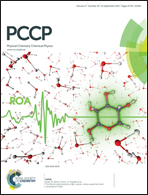Fullerene-based materials for solar cell applications: design of novel acceptors for efficient polymer solar cells – a DFT study†
Abstract
Fossil fuel alternatives, such as solar energy, are moving to the forefront in a variety of research fields. Polymer solar cells (PSCs) hold promise for their potential to be used as low-cost and efficient solar energy converters. PSCs have been commonly made from bicontinuous polymer:fullerene composites or so-called bulk heterojunctions. The conjugated polymer donors and the fullerene derivative acceptors are the key materials for high performance PSCs. In the present study, we have performed density functional theory calculations to investigate the electronic structures and magnetic properties of several representative C60 fullerene derivatives, seeking ways to improve their efficiency as acceptors of photovoltaic devices. In our survey, we have successfully correlated the LUMO energy level as well as chemical hardness, hyper-hardness, nucleus-independent chemical shift, and static dipole polarizability of PC60BM-like fullerene derivative acceptors with the experimental open circuit voltage of the photovoltaic device based on the P3HT:fullerene blend. The obtained structure–property correlations allow finding the best fullerene acceptor match for the P3HT donor. For this purpose, four new fullerene derivatives are proposed and the output parameters for the corresponding P3HT-based devices are predicted. It is found that the proposed fullerene derivatives exhibit better photovoltaic properties than the traditional PC60BM acceptor. The present study opens the way for manipulating fullerene derivatives and developing promising acceptors for solar cell applications.


 Please wait while we load your content...
Please wait while we load your content...